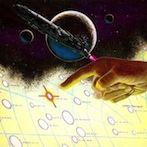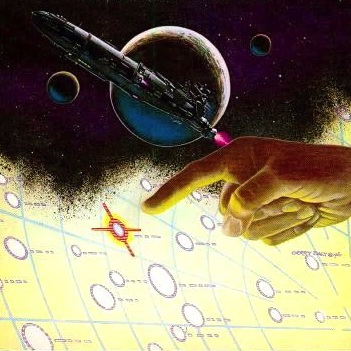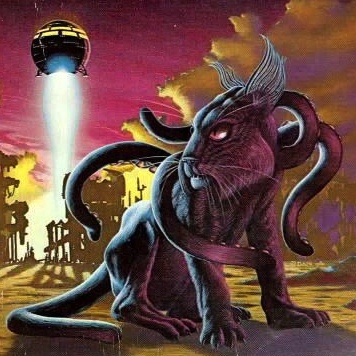Lee Baines was born around 1920 in the little town of Milbrite. After his mother gave birth, his father abandoned them. Although his family was very poor, Lee became the best friend of Dan Thatcher — the son of the wealthiest man in Milbrite — during their time fighting together in World War Two and the Korean War. Both return to Milbrite as highly decorated Air Force officers, and Lee now wishes to marry his girl friend Marsha Campbell. Dan is willing for Lee and Marsha to live in the Thatcher residence until they can find an apartment.
They are married on September 18th, 1953, but the next morning Marsha has disappeared. Lee, Dan, and Marsha's family search for her during the next few months, but without any results. Finally, Marsha's family conclude that Lee must have had something to do with her disappearance, and they break off all contacts with Lee. Devastated, Lee leaves Milbrite.
Many years later, in 1981, Lee is a disappointed and disillusioned fifty-year-old, full of hatred against the whole of Mankind, and especially women. Every evening he sits in front of the TV, watching comedies and news, and makes cynical jokes and comments on the rest of the world. One evening he is watching an interview with a local scientist, Professor Andrew Shadall, who has built a time machine. Shadall tells that he has been able to send inanimate objects and animals to the past and future, though he is not yet able to send anything on more than one trip. Shadall is now looking for human subjects to travel into another time. "Poor H. G. Wells!" says Lee to himself and, after watching some comedies, goes to bed. But in the middle of the night he awakens, thinking for the first time in many years about Marsha, who left him after the "perfect day" in his life — his wedding on September 18th, 1953. He decides that the time machine would be the only way to find out why she left him.
The next day he goes to Shadall and volunteers for a trip into the past, and the Professor accepts Lee's offer. The time machine is inside a van. Shadall sends Lee back to the past to the early morning of September 18th, 1953. He leaves Lee alone at the edge of Milbrite and tells him that he will pick up him 24 hours later near the Thatcher residence.
Lee goes into the city. In the newspapers, he sees the announcement of his upcoming marriage to Marsha. Suddenly, he gets a crazy idea — he calls Marsha and suggests that they should have breakfast at a restaurant. Marsha finds this idea very strange — it's only a few hours before their wedding. She agrees, but wonders about the sound of his voice — it seemed to be the voice of a much older man.
At the restaurant, he waits for her in a dark recess. Marsha comes. They talk, but after a few minutes Marsha wonders about his strange appearance. Then she comes to the conclusion that the man in the recess isn't Lee, but actually his father who wants forgiveness for abandoning his wife and son. Marsha stands up and says that she will tell everything to Lee the next day and that she hopes that Lee will then forgive him. She then leaves.
Not knowing what to do next, he checks into the Milbrite Hotel He is, of course, not recognized by anybody, and writes his name in the register as "Lee Gregory, " using his mother's maiden name as an alias. He spends the afternoon in his little room reflecting on his life. Though not exactly rich he is better off than most men, working as a pilot for the Thatcher family's airline. He uses his money on the necessities of life and brief, superficial flings with widows and single women, but determined never to marry again.
Around midnight, he arrives in the garden of the Thatcher residence and begins watching the windows of the room where his earlier self and Marsha are sleeping. The hours pass, but nothing happens. The sun rises and suddenly Lee hears Marsha's voice. She had been standing on the balcony and saw him behind a hedge. She comes down to him and asks what he is doing here. She goes on to say that it is very inappropriate for a father to stand outside his son's bedroom, especially during the son's wedding night. Lee Baines is shocked — now he knows why Marsha suddenly disappeared from their room that morning!
And indeed, a few seconds later, the van arrives and Shadall says to him and Marsha: "Welcome to the eighties, Mr. and Mrs. Baines!" Apparently, just being in the van's vicinity transports them through time. Lee thinks that it would be very complicated to explain the facts to Marsha, but then he remembers the proverb that in most cases women will have fewer problems adjusting to new situations than men would, and considering that Marsha could be pregnant, he thinks that they will now be able to live happily together.








Tor zu den Sternen was published to celebrate the German publisher Wilhelm Goldmann Verlag's 400th science fiction book, in twenty years of printing SF. The idea of this international anthology was to publish completely new SF stories from a few German authors, some from British and American authors that have never before been published in Germany, and some specially written for this anthology.
The stories specially commissioned for this volume from English-speaking authors are: "Small Change" by Ursula K. LeGuin, "Not an Affair" by Theodore Sturgeon, "The Perfect Day" by A. E. van Vogt, "A Cabin on the Coast" by Gene Wolfe, "Three Evolutionary Enigmas" by Brian W. Aldiss, "While There's Hope..." by John Brunner, "The Naked Chicken" by Edmund Cooper, "The Murderer's Song" by Michael Moorcock, and "Kitemaster" by Keith Roberts. The other stories from English-speaking authors mark their first appearance in German.
This oversize softcover volume has 204 numbered pages, but there are around 40 special pages with colored illustrations throughout the book, and four unnumbered pages at the end of the book showcasing other SF books published by Goldmann.
Van Vogt's story — which is roughly 7,000 words long — is on pages 65 - 73, and it is accompanied by two black-and-white illustrations by Annette Fräger. The story was translated into German by Tony Westermayr.